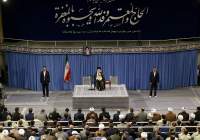By continuing to sell arms to Saudi Arabia, the United States sends a clear signal that the Saudi government is free to continue its brutal torture and imprisonment of advocates like Lujain al-Hathloul, as well as its indiscriminate bombardment of civilians in Yemen, without incurring meaningful consequences.
- Ayatollah Khamenei: US & Zionists will receive a crushing response for what they do against Iran & Resistance
- US moves against cybersecurity ‘risk’ posed by China-made port infrastructure
- Israeli conspiracy behind Iran gas pipeline explosions: Minister
- Assault on Rafah will be met with decisive response: Resistance groups
- India regulator finds $240 mln diverted out of Zee's books, sources say
- Elections are main pillar of the Islamic Republic & in it people are the owners of the country
- Tragedy in Gaza proved current world order is false and will be destroyed :Ayatollah Khamenei
- UNSC to hold meeting on Ukraine on July 17 to be attended by top diplomats
- Today confrontation is btw. the Islamic system & the lying front that calls itself liberal democracy
- Zionists rightly worried about not seeing 80th anniv: Ayatollah Khamenei








